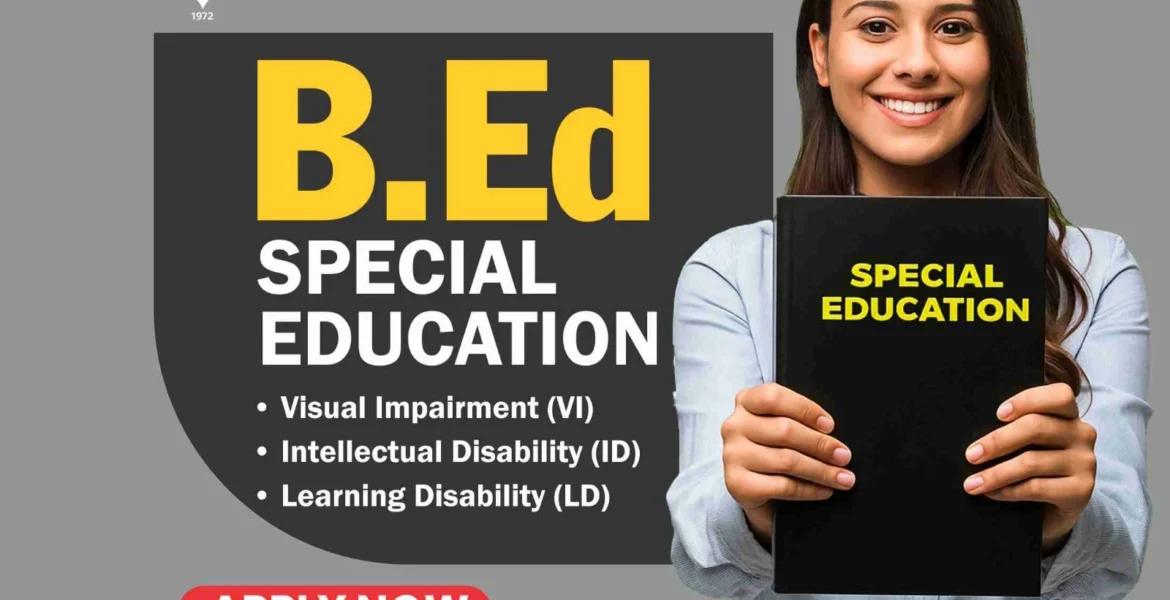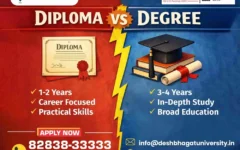B.Ed Special Education in Intellectual Disability: A Complete Guide
July 30, 2025 2025-07-30 7:13B.Ed Special Education in Intellectual Disability: A Complete Guide

B.Ed Special Education in Intellectual Disability: A Complete Guide
If you are passionate about working with children who have intellectual disabilities and want to make a difference in their lives, pursuing a B.Ed. in Special Education with an emphasis on Intellectual Disability is a fulfilling and meaningful career path. This program is designed to train educators who can provide high-quality education to students with intellectual disabilities, ensuring they get the support they need to thrive academically and socially.
In this comprehensive guide, we will explore the B.Ed Special Education in Intellectual Disability program, focusing on what it involves, the curriculum, eligibility criteria, career opportunities, and why Desh Bhagat University (DBU) is a top choice for pursuing this course.
What is B.Ed Special Education in Intellectual Disability?
The B.Ed Special Education in Intellectual Disability is an undergraduate degree program specifically designed to train teachers to work with children who have intellectual disabilities. Intellectual disabilities can range from mild to severe, and they typically affect cognitive functioning, learning abilities, and reasoning, problem-solving, and adaptive behavior.
This program aims to equip students with the knowledge, skills, and tools required to teach children with intellectual disabilities in a way that meets their individual needs. Students will learn to use specialized teaching strategies, adapt the curriculum, and incorporate assistive technologies to create an inclusive learning environment. The program also focuses on developing the emotional intelligence and patience needed to work with children who face mental challenges.
Why is This Program Important?
Students with intellectual disabilities often face challenges that make learning in a regular classroom setting difficult. Without specialized support, they may struggle with traditional teaching methods. B.Ed Special Education in Intellectual Disability equips future teachers with the right tools and strategies to make learning accessible for these students, ensuring they can participate fully in education and reach their potential.
Desh Bhagat University (DBU): A Leading University in India
Desh Bhagat University (DBU) is one of India’s most respected institutions for higher education. The university is known for offering a wide range of undergraduate, postgraduate, and diploma courses in various disciplines. DBU’s Faculty of Education is especially renowned for its B.Ed Special Education in Intellectual Disability program, which is designed to prepare future educators to work effectively with children with intellectual disabilities.
The university is accredited by the Rehabilitation Council of India (RCI), ensuring that all programs adhere to high standards of quality and meet national norms for special education.
Program Overview: What Will You Learn?
The B.Ed Special Education in Intellectual Disability program at DBU spans two years, divided into four semesters. This structure includes both theoretical coursework and practical training to provide a balanced learning experience. Students will learn how to identify intellectual disabilities, understand the challenges faced by these students, and adopt various teaching techniques to address those challenges effectively.
Curriculum Breakdown
The curriculum of the B.Ed Special Education in Intellectual Disability program includes a mix of core subjects, practical experience, and electives. Below is an overview of the subjects covered in the program:
Year 1:
- Semester 1:
- Educational Psychology: Understand how children with intellectual disabilities learn and develop.
- Philosophical and Sociological Foundations of Education: Learn about the social and philosophical aspects of education.
- Introduction to Special Education: Explore the basics of special education and its importance.
- Human Anatomy and Physiology: Study how the human body functions, with a focus on the nervous system.
- Semester 2:
- Methods of Teaching Children with Intellectual Disabilities: Learn specialized teaching methods that can help children with intellectual disabilities.
- Educational Technology and Media: Understand how technology and media can support learning for children with special needs.
- Curriculum and Instructional Strategies: Discover how to adapt and modify curricula for children with intellectual disabilities.
- Assessment and Evaluation in Special Education: Learn how to assess students with disabilities and evaluate their progress.
Year 2:
- Semester 3:
- Inclusive Education and Classroom Management: Learn how to manage a classroom with students of varying needs and ensure all students are included in the learning process.
- Orientation and Mobility Training: Teach students with intellectual disabilities to move around independently and safely.
- Assistive Technology for Intellectual Disabilities: Study the technologies available to support children with intellectual disabilities in learning.
- Social Skills and Life Skills Training: Focus on teaching students the essential social and life skills they need for independence.
- Semester 4:
- Research Methodology in Special Education: Learn how to conduct research related to special education and intellectual disabilities.
- Community-Based Rehabilitation: Understand how rehabilitation services can support individuals with intellectual disabilities in their communities.
- Practical Training and Internship: Gain hands-on experience by working directly with students with intellectual disabilities.
- Project Work and Thesis: Complete a research project or thesis related to the field of special education.
Eligibility Criteria
- Educational Qualification:
- Candidates should have completed their Bachelor’s degree in any discipline from a recognized university with at least 50% marks.
- Additional criteria may apply for candidates with a technical background or specific streams, so it’s important to check the specific requirements set by DBU.
- Entrance Exam:
- Candidates may be required to take an entrance exam as part of the admission process. The exam is designed to assess the applicant’s aptitude and understanding of the program’s requirements.
- Age Limit:
- The age limit will be determined by DBU’s norms and government regulations.
Career Opportunities
The B.Ed Special Education in Intellectual Disability program opens up a wide range of career opportunities. Graduates can work in both public and private sectors, including schools, rehabilitation centers, NGOs, and government organizations. Here are some of the career paths for graduates:
- Special Education Teacher: Work in special schools or inclusive schools to teach children with intellectual disabilities.
- Resource Teacher: Provide additional support to students with intellectual disabilities in mainstream classrooms.
- Educational Consultant: Advise schools and organizations on how to create inclusive learning environments.
- Curriculum Developer: Design specialized educational materials and curricula for students with intellectual disabilities.
- Community Rehabilitation Worker: Work with communities to support individuals with intellectual disabilities and promote social inclusion.
- Researcher: Conduct research to improve educational practices and methodologies for students with intellectual disabilities.
Graduates can also pursue further studies in special education, focusing on advanced research or policy development.
Why Choose Desh Bhagat University?
There are several reasons why Desh Bhagat University (DBU) stands out as an excellent choice for pursuing the B.Ed Special Education in Intellectual Disability:
- Accredited Program: DBU’s program is approved by the Rehabilitation Council of India (RCI), ensuring that the education you receive meets national standards for special education.
- Experienced Faculty: DBU has experienced faculty members who are experts in the field of special education. They bring both practical knowledge and academic insights into the classroom.
- Hands-On Learning: DBU’s program includes practical training and internships, allowing students to gain real-world experience working with children with intellectual disabilities.
- State-of-the-Art Facilities: The University is equipped with modern classrooms, research labs, and technology to support students in their learning journey.
- Strong Career Support: DBU provides career counseling, job placement services, and networking opportunities, helping students find relevant employment after graduation.

Admission Process
The admission process for the B.Ed Special Education in Intellectual Disability program at DBU is straightforward:
- Application Submission:
- Interested candidates need to fill out the online application form (https://www.admissions.deshbhagatuniversity.in/).
- Eligibility Check:
- DBU will review the eligibility of candidates based on their academic qualifications.
- Entrance Exam (if applicable):
- Some candidates may need to take an entrance exam.
- Interview and Counseling:
- Shortlisted candidates will be invited for an interview or counseling session.
- Document Verification:
- Candidates need to submit the required documents for verification.
- Fee Payment:
- After verification, candidates can proceed with the payment of the admission fee.
Conclusion
The B.Ed Special Education in Intellectual Disability program at Desh Bhagat University is a complete course that helps students learns how to teach and support children with intellectual disabilities. The program includes both classroom lessons and hands-on experience, so students are ready to start a rewarding career in special education.
If you’re passionate about making a difference in the lives of students with intellectual disabilities, the B.Ed Special Education in Intellectual Disability program at DBU is an excellent choice. By becoming a skilled special education teacher, you can help students break through learning challenges and make education fairer and more inclusive for everyone.
FAQs
1. What is B.Ed Special Education in Intellectual Disability?
B.Ed Special Education in Intellectual Disability is a program that trains teachers to work with students who have intellectual disabilities. These disabilities affect learning, reasoning, and problem-solving abilities. The program teaches teachers how to support these students using specialized methods, tools, and assistive technology to help them succeed in their education.
2. Who should pursue a B.Ed in Special Education for Intellectual Disability?
Anyone who is passionate about working with children with intellectual disabilities should consider this program. If you want to make a difference in the lives of children who need extra support to learn, this program is a great choice. You must be patient, empathetic, and dedicated to inclusive education.
3. What is the duration of the B.Ed Special Education in Intellectual Disability program?
The B.Ed Special Education in Intellectual Disability program typically lasts for two years. This includes four semesters, where students study both theory and practice. The program ensures students are ready to work in real-world settings, helping them gain practical skills alongside academic knowledge.
4. What subjects are taught in the B.Ed Special Education in Intellectual Disability program?
The subjects covered in the program include educational psychology, methods of teaching children with intellectual disabilities, curriculum adaptation, and assistive technology. Students also learn about inclusive education, classroom management, life skills training, and research methodology. The program ensures students understand how to teach and support students with intellectual disabilities.
5. What qualifications do I need to apply for the B.Ed Special Education in Intellectual Disability program?
To apply for the B.Ed Special Education in Intellectual Disability program, you must have a Bachelor’s degree from a recognized university with at least 50% marks. If required, you may need to pass an entrance exam. The university sets the age limits, and it may provide relaxation for reserved categories.
6. What career opportunities are available after completing this program?
After completing this program, you can work as a special education teacher, resource teacher, or educational consultant. You can also work in community rehabilitation, as a curriculum developer, or in schools and NGOs that focus on special education. This program opens many career paths in the field of special education.
7. What is the difference between regular education and special education for intellectual disabilities?
Regular education generally focuses on teaching all students in the same way, while special education for intellectual disabilities tailors teaching methods to meet the individual needs of students with intellectual challenges. Special education uses techniques such as adapting the curriculum, using assistive technologies, and providing additional support to help these students succeed.
8. How does practical training work in this program?
Practical training in the B.Ed Special Education in Intellectual Disability program involves internships where students work directly with children who have intellectual disabilities. During these internships, students apply what they’ve learned in real-world settings, such as schools or special education centers, gaining valuable hands-on experience.
9. Are there scholarships available for the B.Ed Special Education in Intellectual Disability program?
Yes, many universities, including Desh Bhagat University, offer scholarships to students based on merit or financial need. Some scholarships may be specifically for students from certain backgrounds or communities. It’s a good idea to check the university’s official website or contact the admissions office for detailed information on available scholarships.
10. Why should I choose Desh Bhagat University for this program?
Desh Bhagat University offers a well-structured B.Ed Special Education in Intellectual Disability program with experienced faculty and strong practical training. The Rehabilitation Council of India (RCI) approves the program, ensuring high standards of education. DBU’s focus on practical experience, career support, and modern facilities makes it an excellent choice for aspiring educators.






